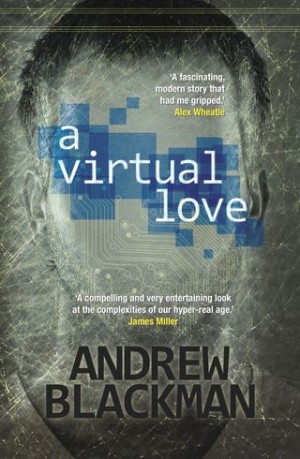You have no items in your cart. Want to get some nice things?
Go shopping
The way that online identity is changing our real world relationships is much discussed in the press but thusfar has seen relatively little literary exploration. Andrew Blackman’s new novel – A Virtual Love – takes up this challenge and raises some interesting questions.
The novel follows Jeff Brennan, a seemingly mediocre IT consultant in Milton Keynes, who is mistaken for a famous political blogger who shares his name. When he meets Marie, a beautiful Californian girl, obsessed with the political blog of a different, reclusive Jeff Brennan, he can’t believe his luck and they embark on a relationship built around one rather large lie.
The entire story is told through the prism of Jeff Brenan’s friends and family. Each chapter describes a different perspective as characters relate their version of events to Jeff but Blackman chooses to render him silent, despite being the main character. This stylistic choice creates a fresh texture to the novel but as a result the writing is a strange mix of first person and second person singular which can create a certain distance and does not always work in conjuring up believable characters:
“It’s just an identity, just how I choose to portray myself.”
“And how you choose to portray yourself with me, the dutiful grandson, drinking tea and chatting politely and asking we’re doing okay, is that your real identity?”
“Of course, Grandad.”
The central theme of virtual identities and the corrupting effect of secrecy on relationships is certainly thought-provoking and the novel explores several different angles as the characters present their differing versions of events. While the story is ostensibly about Jeff’s deceit with Marie, nearly every character attempts to hide or distort the truth in some way. The political blogger hides his true identity behind a virtual wall. Jeff’s colleague at work uses coercion to improve her sexual profile. Marcus distorts content for his own aim.
“In the original spirit of the web, these guys share their information with the world…Information can be used in a lot of ways, though, so if you have bad intentions, like I did that night, you can trawl through these lists of discoveries and test out the vulnerabilities.”
The one exception to this is Jeff’s girlfriend Marie who comes across as startlingly gullible. Despite being entranced by the insightful blog posts that the virtual Jeff Brennan publishes she appears to have very little critical appraisal of the world around her. Considering the current, rather shabby, state of UK politics it is hard to understand why a young American girl, with no obvious connection to the political world, would find these blog posts quite so transcendental.
To an extent, this is a problem with all the characters, in that they are primarily relating Jeff’s story so that it feels like their own narratives are second-hand. As a result it can be hard to connect with the characters. There are numerous mentions of blogging as an activity but hardly any mention of what is actually being written about. Even the creator of the UK’s number one political blog seems to see it more as a task, akin to ironing, rather than a creative process driven by the ideas themselves.
While the characters are not always plausible this does force the reader to question quite how impartial each account is. Where characters are not credible it is not because the world of the novel is fantastical or unrealistic – they inhabit the same modern Britain as the reader.
The topics raised throughout the book are precisely the issues that we all sub-consciously navigate on a daily basis. In a sense the question is no longer whether online identities affect our relationships or not but what kind of relationships, in the modern world, can exist without virtual identities.
“So it’s just on the net that you’re not real.” Your response was a weary sigh. “It’s not that, it’s just that I have different identities for different places. I experiment.”
A Virtual Love was published in April 2013.

About Lochlan Bloom
Lochlan Bloom is a British novelist, screenwriter and short story writer. The BBC Writersroom describes his writing as ‘unsettling and compelling… vivid, taut and grimly effective work’. He is the author of the novel The Wave as well as the short fiction pieces – Trade and The Open Cage. He has written for IronBox Films, BBC Radio, Slant Magazine, Litro Magazine, Porcelain Film, EIU, H+ Magazine and Calliope, the official publication of the Writers’ Special Interest Group (SIG) of American Mensa, amongst others





I really do agree about Marie appearing quite gullible. In fact, I think the book lost me a little on the frequent contrivances, which one had to buy into to keep the plot moving forwards. Not a bad book, but I’d have liked a lot more from it.
My review: A Virtual Love by Andrew Blackman